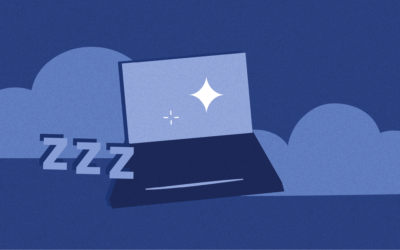Getting enough sleep is incredibly important for us, as we require sleep to function. In fact, sleep regulates all of our vital organs, so without sleep we affect not only our mental state, but also our physical wellbeing.
According to the National Lung Heart and Blood Institute (NHLBI), the damage from sleep deficiency can occur in an instant (such as getting into a car crash), or it can harm you over time. The NHLBI add that Adults over 18 years old typically need 7-8 hours per night. Routinely losing sleep can result in ‘sleep debt’. For example, if you lose 2 hours of sleep each night, you’ll have a sleep debt of 14 hours after a week. This can be raise our risk of chronic health problems. It also can affect how well we react, work, learn, and get along with others.
But, how can we improve our sleep? Most of us regularly lose sleep due to stress, anxiety, or depression. When our mind is busy during the day, it’s often difficult to switch off at night. Then, the vicious cycle begins, as we are sleep deprived thus irritable, have impaired judgement and are at a higher risk to develop further anxiety or depression.
This is why we dream! Dreaming is a very essential component of the biological regulating of the mind, and of our emotional balance. A noted dream researcher, Rosalind Cartwright (Psychology PhD, Chicago’s Rush University) says: “dreaming modulates disturbances in emotion, regulating those that are troublesome… It’s almost like having an internal therapist, because you associate [through dreams] to previous similar feelings, and you work through the emotion related to it so that it is reduced by morning.” Dreams can serve as a powerful tool that help us unlock our subconscious, solve the issues we’re facing in our waking life, and learn more about ourselves. It’s kind of why they say “sleep on it”!
Yes, dreams help us to analyze, explain, regulate and remember recent events in our lives, in a kind of “mental housekeeping” process. According to clinical psychotherapist, Jeffrey Sumber: “Dreams also allow us to process information or events that may be painful or confusing in an environment that is at once emotionally real but physically unreal.” Dr. Matthew Walker, UC Berkeley, adds: “I think of dreaming as overnight therapy. It provides a nocturnal soothing balm that takes the short edges off of our emotional experiences so we feel better the next day.”
Often our dreams are actually full of hidden messages, that if we try to decode, could help us in our waking lives. If knowledge is power, then there is no greater power than knowing oneself! According to The National Sleep Foundation, dreams can force us to face an emotional circumstance that’s actually happening in our life, thus allowing us to deal with the emotions in our dreams – a safe and protected environment. Our dreams can help us see the situation in a different light or understand something new about ourselves. Dreams might also help us get to the root of whatever may be causing us to feel anger, fear, or envy. Processing our emotions in a safe environment such as our dreamland, can help us to understand ourselves better and therefore stop running away from life’s problems and face them head on. Sleep studies of recently divorced women with untreated clinical depression, have found that dreaming may also help alleviate depression. Patients who recalled dreams and incorporated the ex-spouse or relationship into their dreams scored better on tests of mood in the morning. And they were much more likely to recover from depression than others who either did not dream about the marriage or could not recall their dreams.
Norepinephrine, a naturally occurring chemical in the body that acts as both a stress hormone and neurotransmitter is released into the blood when the brain perceives that a stressful event has occurred and affects the degree to which the amygdala — the fear center of the brain — is sensitive to stimuli. However, the part of the brain that secretes norepinephrine during wakefulness and non-REM sleep takes a break during Rapid Eye Movement (REM) sleep, according to Itamar Lerner, co-author of the new paper and a postdoctoral sleep researcher at Rutgers University. That shows us how the emotional regulation aspect of dreams has therapeutic value, and decoding our dreams furthers this exploration of the issue, resulting in lowered stress levels and… better quality of sleep! REM sleep also stimulates the brain regions used in learning. One study found that REM sleep affects learning of certain mental skills. People taught a skill and then deprived of non-REM sleep could recall what they had learned after sleeping, while people deprived of REM sleep could not.
As Carl Jung said: “your vision will become clear only when you can look into your own heart. Who looks outside, dreams; who looks inside, awakes.”
So tomorrow, when you wake up, stay still for a moment longer. Go ahead and turn that awful buzzing alarm off, lie right back down, close your eyes, and try to conjure up the images from the dream that is just beginning to fade away. Ask yourself, “Where was I, who else was there, and what was happening?” It’s ok if very little details actually emerge. Whatever you think it might have been, don’t doubt it! Most importantly, ask yourself: How did I feel about it all? Did you wake up feeling anxious, excited, sad, or maybe lustful? Also, try keeping a sleep diary for a couple of weeks. Write down how much you sleep each night, how alert and rested you feel in the morning, and how sleepy you feel during the day. By working through your dreams you’ll find that you sleep better, dream better, and feel better.
Dream more with the Somnox Sleep Robot
For people that suffer from stress and anxiety it’s harder to shut off your brain, making it difficult to fall asleep. The Somnox Sleep Robot helps you to fall asleep faster, sleep longer and wake up more refreshed.
Guest blog written by DreaMe:
DreaME is the first Machine Learning-Powered, personalized dream interpretation app, designed to help users dream better, sleep better, and be better.


